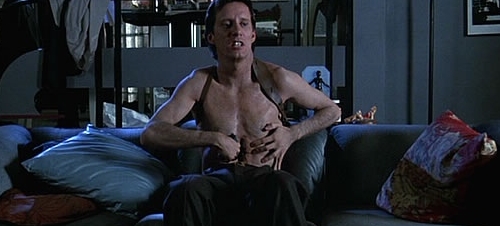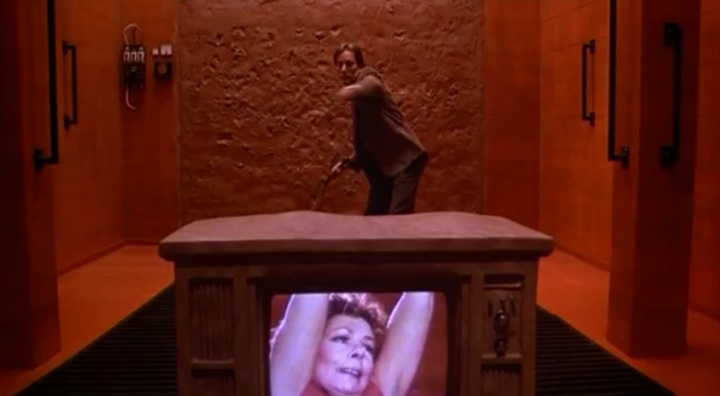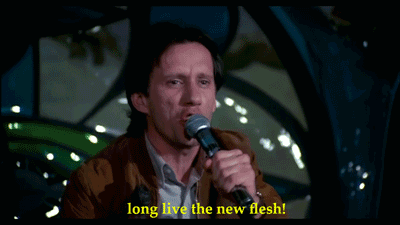About a month ago, I settle my bum down to watch a movie that transcends any other horror movies. After doing much research beforehand, I was hesitant, after all, this movie had many people hit back at it. Much to my surprise, I devoured this movie and yearned for more. Though the images are completely, to put it bluntly, bat shit insane; Videodrome has been playing on my mind since I first watched it, much like Max Renn’s encounter with the omnipotent cassette.
For those out of the loop, Videodrome is about Max Renn, the head of a small television channel which showcases porn and uncouth programming. During the hunt to find something never seen before, Renn comes across a snuff film called Videodrome, that changes every time he sees it. However, there is something much more to the movie than meets the eye and as Renn starts to hallucinate about the video tape. Taking you on a sexual sadomasochist journey of the graphic and perturbed, Cronenberg presents a horror flick that encapsulates late night viewing of the eighties and still manages to be ahead of its time.
Why?
Because it is insanely feminist.
“He is ruled by the metaphorical penis of the videotape being inserted into his vagina” – Bills Movie Emporium.

Let’s get the first most strikingly feminine image out of the way first. When ‘Videodrome’ begins to possess Max, he develops a vagina shaped wound right in his stomach. Almost instantly, he becomes powerless, afraid and subjected to the whims of the men controlling ‘Videodrome’. The orifice gets the actual videotape inserted unwillingly into it which could definitely allude to a critical comment on sexual violence against women. This simple act is a comment on not only on how women of the era (and hell, even now,) were perceived but how femininity was also perceive. Only later on in the film, Nicky insists he uses this new found “gift” against them and he now has strength despite his assault and manipulation. Max is presented with a dual personality, a combination of masculinity and femininity that allows him to rise up against ‘Videodrome’.
Interestingly enough, this voyeurism on Max’s new sexual identity reflects a lot of themes that horror movies have perpetuated. The idea of castration and emasculation have powered movies along. For example, Alien was a representation of childbirth. Even literally with movies such as Last House of the Left and Cannibal Holocaust taking a chunk out of the genitalia. Horror have subverted men’s fear of a woman dominated world that may turn them into “the weaker sex,” all the while punishing girls for being female. Without hesitation, ‘Videodrome’ gives Max a way to explore the fear of femininity and eventually embrace it, allowing equal spirits to combine.
“Videodrome is full of ambivalence: firstly, female characters are represented in the movie in dual way, both as “evil” manipulators and as pliable, seductive, soft creatures.” – Anna Toplina

Speaking of dual personalities, while not playing with the feminism imagery of James Woods stomach opened like a lady garden, Cronenberg’s work also portrays the women of the story in rounded and deep way. Though the clichéd archetypes are presented here, the mother, the femme fatale and the virgin, Cronenberg’s film smashes through them flipping them on your head. I’ve spoken about this before (and to anyone with an ear or two,) Nicky objectively sits on a television show stating how the world has become too over sexualised and eases other women through their plights with her soft, soothing voice. Yet when she sleeps with Max, she is shown to be able to enjoy pain and BDSM, intrigued by snuff and pornography. She also practises it in a way where she is in control. This is extremely important; consent in sex is important. Nicky regulates her eroticism but can still recognise flaws in media portrayal.
“Porn can be incredibly feminist. It’s the same as any other form of media” – Rosalarian
The other two female characters are just as layered than before. Masha is a pornographer. Distributing what Renn calls “naïve” and “soft” porn, Masha is still a feminist. Though she is presented as a mother figure, her porn distribution is safe and “fake.” Despite circulating sexual entertainment for gratification, she abhors snuff and real porn. Her character feels like a protector but still able to enter the world of sex and porn. She’s our mother, not just how we see her but how our matriarchs certainly are.
Finally, we get to Bianca. The saint and “the virgin,” she is there as a straight path for Max. Working at a salvation for the homeless, one would never think that she would fall into ‘Videodrome’ eye. But she has history and though the most secretive, she is inclined to ‘Videodrome’ and her father’s work, become the voice against it, though lurking in the shadows.
“The media often presents women as cleaners, housewives, domestic servants providing comfort and support for men, a man’s sex object to service men’s sexual needs, ect. The media suggests these roles are natural and normal. Feminists see this as an example of patriarchal ideology- a set of beliefs which distorts reality and supports male dominance.” – Lee Bryant
It’s inside ‘Videodrome’ where the nature of media and pornography falls under the Cronenberg hammer. While outside the goggle-box, our females are this compelling and engrossing characters, as soon as Max enters the damaging world they become stereotypes again. Cronenberg presents feminism in the eye of the media. Nicky becomes a seductress, charged with tempting Renn to kill. Masha becomes punished and killed for wavering outside of her mother like image. It can be argued that this is a direct complaint against the porn industry where snuff films may actually exist. While porn can be feminine (certainly in the hands of Masha) the constant need for shocking and debauchery content to stimulate our desire have forced misogyny and abuse on women in the industry (see here.) Videodrome is a direct attack on it, Max’s need for more gruesome and scandalous porn for views who have become “bored” causes mayhem not just for him, but everyone he touches.
The media, especially in horror are so quick to subject their female characters to sexual violence; viewing rape as entertainment to shock and provoke. With Videodrome, violence against women is portrayed as gruesome, barbaric and wrong including the allusions to Max’s now female status. Alongside his now blossoming femininity and that influence from female characters, he is able to convey resilience. One can argue that Cronenberg isn’t so much subjecting his “feminine” characters to it but instead turning to the males in the audience and going, “hey, you, stop putting women through this.”
Feminism is about equality. Feminism within cinema is about characters that are not one dimensional and ooze with characterisation coming. Feminism is never about over sexualising women under the misogyny blanket. Nor is it about keep us virginal. It is a shame that Cronenberg’s masterpiece was shot down by feminist groups of first release. Compared to other horror movies such as Friday the 13th and Carrie where women and girls are punished for exploring sex, Videodrome is this intellectual comment that allows women to own their own desires. Hitting at media exploitation and a misogynistic world, Videodrome could still stand today and people could learn from its themes. Frankly, it is one of the most feminist horror movies of all time.
“Long live the new flesh.”



no
LikeLike